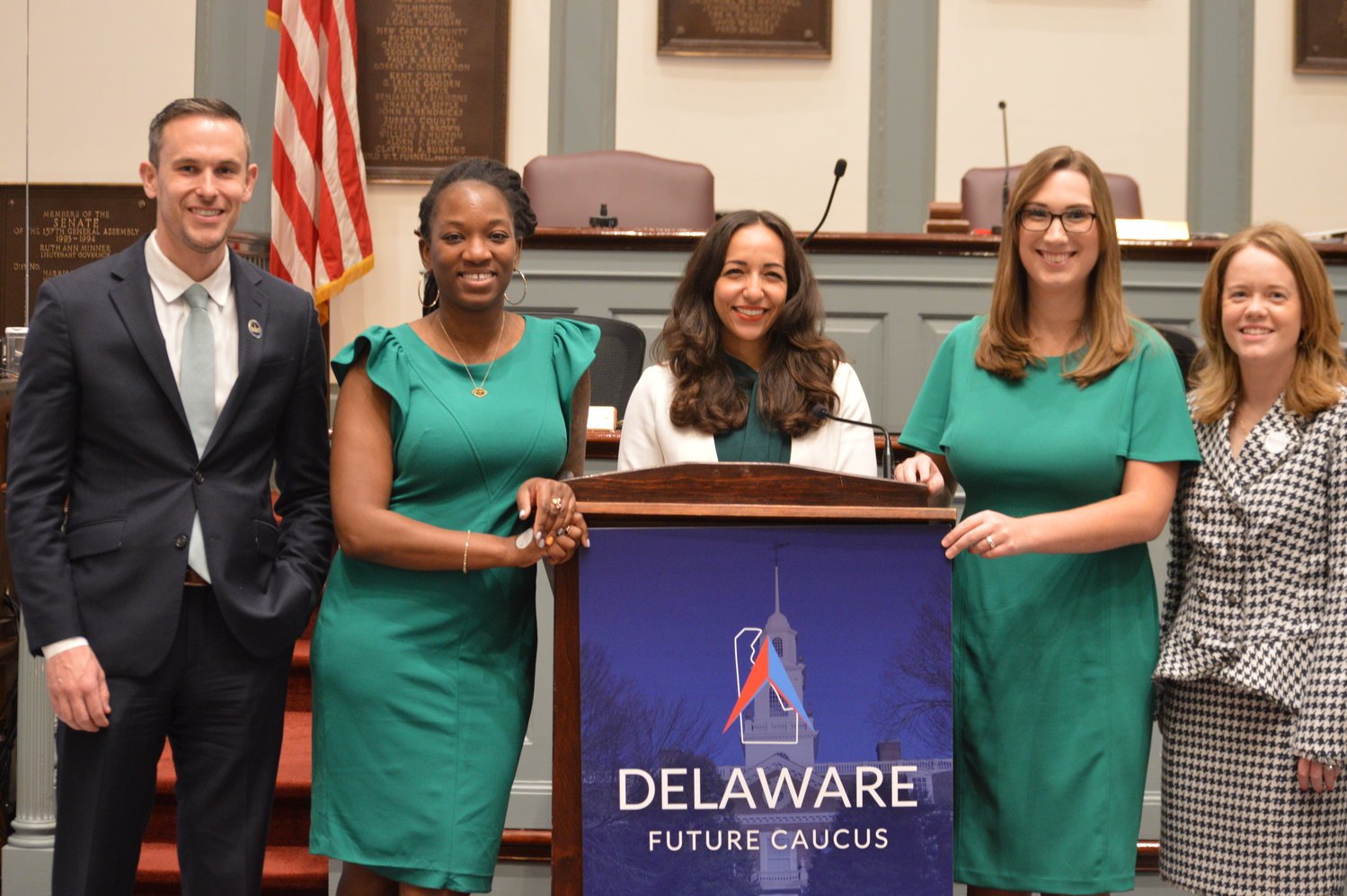Delaware lawmakers launch bipartisan Future Caucus
April 2, 2023
On Tuesday afternoon, a bipartisan group of legislators, in conjunction with the Millennial Action Plan, launched the Delaware Future Caucus.


JOE EDELEN/DELAWARE STATE NEWS
Rep. Mike Smith, Sen. Marie Pinkney, Millennial Action Project President & CEO Layla Zaidane, Sen. Sarah McBride and Sen. Kyle Evans Gay, D-Talleyville, following the launch of the Delaware Future Caucus in the Senate chamber Tuesday
DOVER—Lawmakers returned to Legislative Hall this week, wasting no time before getting back to business.
Tuesday’s Senate agenda garnered attention from constituents throughout the state, who traveled to Dover to fill the chamber for the consideration of marijuana legalization and regulation legislation.
Both bills passed, which set the tone for another busy week in the state capitol.
Marijuana legislation
Gov. John Carney’s concerns regarding the legalization and regulation of marijuana have remained, but according to a spokesperson Tuesday, he has not yet decided his course of action following the initiative’s passage.
A governor’s veto on House Bills 1 and 2 remain a possibility, though sponsor Rep. Ed Osienski, D-Newark, has stated his confidence in the General Assembly’s ability to override a veto this time around.
Breaking away from Gov. Carney’s stance on marijuana regulation, Lt. Gov. Bethany Hall-Long reiterated her support for legalization and regulation earlier this week.
“I have been a longtime advocate for legalizing marijuana in Delaware and as a member of the General Assembly, I voted for both medical and de-criminalization legislation. Moving forward, we need to avoid mistakes made in other states and regulate marijuana properly to keep it out of the hands of our children, to ensure product and workplace safety and to also ensure fairness for businesses and for the medical use of marijuana,” Lt. Gov. Hall-Long said.
“There is work to be done to establish the necessary regulations to achieve these goals and a timeline that achieves the goal of safely legalizing marijuana for recreational use.”
One lawmaker, Sen. Bryant Richardson, R-Seaford, wrote a public letter Friday urging Gov. Carney to veto the legislation, citing highway safety concerns and the ongoing drug death epidemic.
Realty Transfer Tax
On Tuesday, the House Revenue & Finance Committee considered House Bill 67, sponsored by Rep. Bryan Shupe, R-Milford, which would exempt individuals who sells their primary home from paying the realty transfer tax a second time should they buy a new primary home within one year.
Rep. Shupe has said the state’s existing 4% realty transfer tax, which is split evenly between the buyer and seller, is “very overburdensome” for Delaware residents. Specifically, he has emphasized that the tax cannot be rolled over into a mortgage payment and is required to be paid out-of-pocket.
At Tuesday’s meeting, committee members were hesitant to support the legislation because its fiscal note had not yet been completed.
After Deputy Secretary of Finance Rebecca Goldsmith was called as a witness, she said the department is against the legislation, noting the realty transfer tax generates approximately $304 million, or 5% of the state’s general fund revenue.
“Any kind of permanent reduction in realty transfer tax without a corresponding increase elsewhere creates a long-term revenue decline,” she said.
Ms. Goldsmith also claimed the legislation had a number of loopholes, which she said were communicated to Rep. Shupe in efforts to tighten the legislation up.
Rep. Shupe said those loopholes were never described in depth and emphasized that fiscal notes are not always exact and merely an estimate.
“There was a communication of ‘we don’t want this (legislation),’ not ‘here’s how we can close this loophole,’” Rep. Shupe said.
The legislation was ultimately tabled, though Committee Chair Rep. Paul Baumbach, D-Newark, committed to considering the legislation after it is revised.
Future Caucus
On Tuesday afternoon, a bipartisan group of legislators, in conjunction with the Millennial Action Plan, launched the Delaware Future Caucus.
The caucus is being led by Sen. Sarah McBride, D-Wilmington; Rep. Bryan Shupe, R-Milford; Sen. Kyle Evans Gay, D-Talleyville; and Rep. Michael Smith, R-Pike Creek.
With its launch, Delaware joins 31 other states to partner with the Millennial Action Plan’s Future Caucus network.
During a press conference held in the Senate chamber Tuesday afternoon, all four state legislators emphasized the importance of bipartisanship, civility and collaboration to provide equitable solutions for Delawareans.
“Young legislators bring a unique perspective to the table in tackling our state’s long-term challenges that our generation will face in the decades to come. To win the future, we need a sense of urgency, creativity, and boldness, along with a willingness to challenge ourselves and one another through thoughtful dialogue across the political spectrum,” Sen. McBride said.
“I’m incredibly proud to join with other young legislators of both parties in both chambers to form the Delaware Future Caucus so that, together, we can build a stronger, sustainable, and more prosperous tomorrow.”
Atheism Awareness Day
Rep. Eric Morrison, D-Glasgow, introduced a newly modified House concurrent resolution to the chamber floor during Thursday’s session.
The legislation, House Concurrent Resolution 28, officially recognized March 30 as Atheist Awareness Day in the First State.
Two weeks prior, Rep. Morrison introduced a resolution that would have recognized March 16 as National Atheist Day, but it failed by a vote of 11 for, 26 against, two not voting and two absent.
Rep. Morrison explained the day was a way to recognize everyone’s individual beliefs and the religion they practice, though opponents cited constituent concerns regarding the resolution.
Prior to a voice vote on the awareness day resolution, Rep. Morrison commended House Minority Leader Mike Ramone, R-Newark, for his help in communicating his colleagues’ concerns.
House Concurrent Resolution 28 ultimately passed, officially recognizing March 30 as Atheist Awareness Day in Delaware.






Join 1,900+ BIPARTISAN LEADERS NATIONWIDE
Be a part of a network of lawmakers committed to governing effectively, passing more representative public policy, and increasing public trust in democracy.